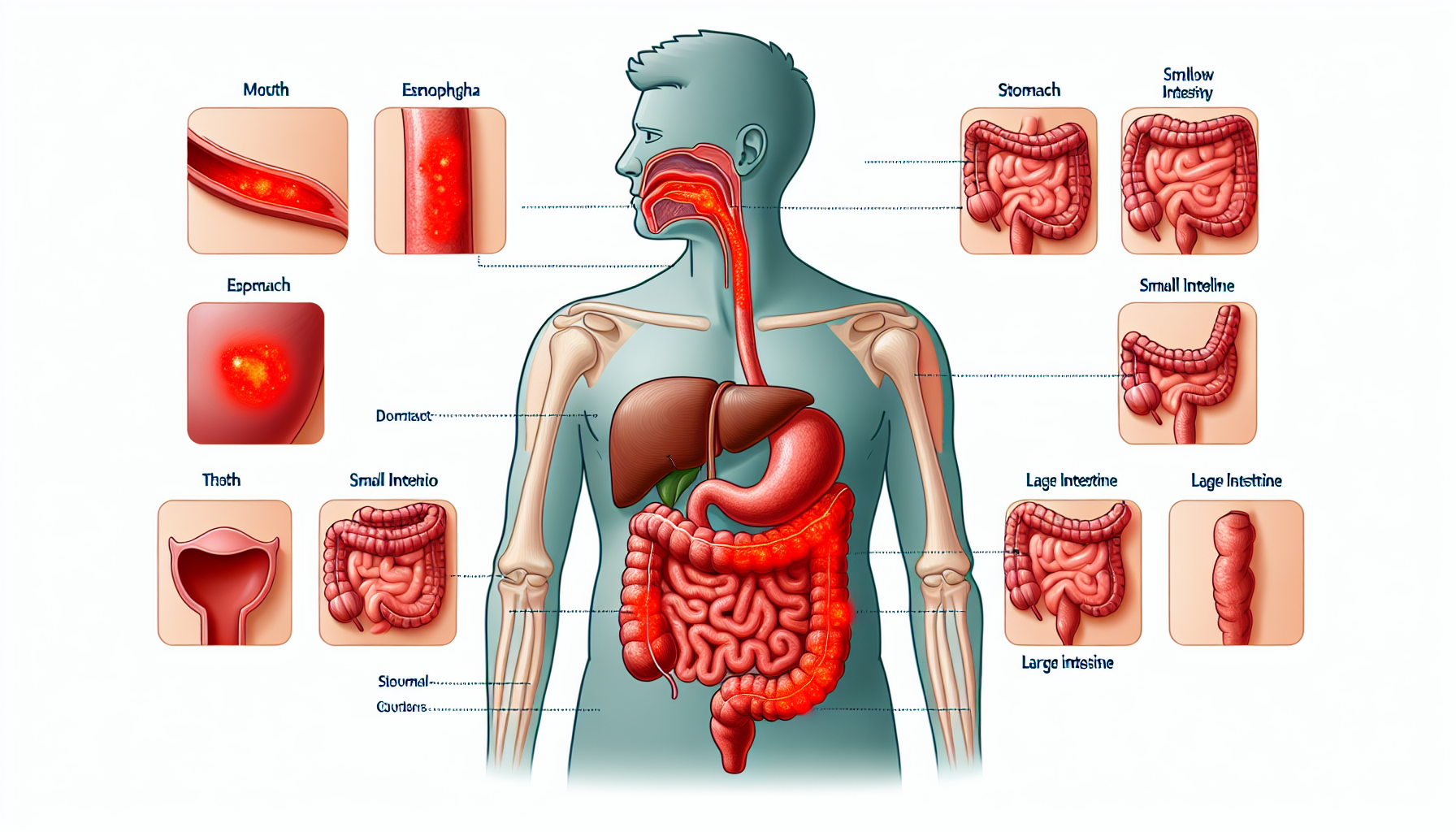Chronic inflammation is a persistent, low-grade inflammation that can affect the body over an extended period. While inflammation is a natural response to injury or infection, chronic inflammation can have detrimental effects on the body, including the digestive system.
The digestive tract is particularly susceptible to the consequences of chronic inflammation. The lining of the gut is designed to allow the absorption of nutrients while acting as a barrier to harmful substances. However, prolonged inflammation can damage this delicate lining, leading to a host of digestive issues. This article will explore the risks associated with chronic inflammation in the digestive system and offer insights into potential remedies.
Understanding Digestive Inflammation
Chronic inflammation in the digestive system is often associated with conditions such as Crohn’s Disease, ulcerative colitis, and gastritis. These conditions can cause symptoms like abdominal pain, bloating, diarrhea, and weight loss. Inflammation can also contribute to the development of more severe conditions like colorectal cancer.
One of the contributors to chronic inflammation is diet. Diets high in processed foods, sugar, and unhealthy fats can increase inflammation throughout the body, including the digestive tract. Conversely, diets rich in whole foods, such as fruits, vegetables, and lean proteins, can help reduce inflammation.
The gut microbiome also plays a crucial role in modulating inflammation. A diverse and balanced microbiome can protect against inflammation, while an imbalanced one can exacerbate it. Probiotics, which are beneficial bacteria, can help support a healthy microbiome, as discussed in Probiotics and Prebiotics: Nourishing a Healthy Gut Microbiome.
The Risks of Chronic Digestive Inflammation
Chronic inflammation in the gastrointestinal system can lead to several risks, including:
-
Increased Permeability: Chronic inflammation can lead to a condition commonly known as "leaky gut," where the intestinal barrier becomes more permeable, allowing bacteria and toxins to enter the bloodstream.
-
Autoimmune Disorders: There is a strong link between chronic inflammation and the development of autoimmune disorders. The immune system may start attacking healthy body tissues, mistaking them for harmful pathogens.
-
Digestive Disorders: Conditions like Irritable Bowel Syndrome (IBS) and Gastroesophageal Reflux Disease (GERD) have been associated with chronic inflammation.
-
Nutrient Malabsorption: Inflammation can damage the cells lining the gut, leading to poor absorption of nutrients, which can cause deficiencies and contribute to a range of health issues.
Remedies for Chronic Digestive Inflammation
Diet and Nutrition
Diet plays a pivotal role in managing inflammation. Incorporating anti-inflammatory foods like omega-3 fatty acids found in fish, flaxseeds, and walnuts can help. Additionally, a diet that is rich in antioxidants from fruits and vegetables can combat oxidative stress, which is a contributor to inflammation.
A particular mention is warranted for CBD, as it has been gaining attention for its anti-inflammatory properties. Products like those found on SuperGreatCBD can be incorporated into a wellness routine for those interested in exploring alternative remedies. However, it’s important to consult a health professional before starting any new supplement.
Probiotics and Prebiotics
Maintaining a healthy gut microbiome is essential for reducing inflammation. Probiotics introduce beneficial bacteria to the gut, while prebiotics provide the necessary nutrients to support them. Fermented foods like yogurt, kefir, and sauerkraut are natural sources of probiotics.
Herbal Remedies
Herbs like turmeric, ginger, and green tea have anti-inflammatory properties and can be included in the diet or taken as supplements. These natural herbs can support digestive health and reduce inflammation.
Stress Management
Stress can exacerbate inflammation in the digestive system. Techniques like mindfulness meditation, yoga, and deep-breathing exercises can help manage stress and may reduce inflammation, as highlighted in Stress and Its Impact on the Digestive System.
Regular Exercise
Exercise can help reduce inflammation throughout the body, including the digestive system. Engaging in regular physical activity can improve gut motility and reduce the symptoms of chronic digestive conditions.
External Resources
To further understand the connection between diet and inflammation, the Harvard Health Publishing provides a detailed overview of foods that combat inflammation.
For those looking into probiotics, the World Gastroenterology Organisation offers a global guideline on probiotics and prebiotics that can be valuable.
The National Center for Complementary and Integrative Health gives evidence-based information regarding the use of probiotics as part of health management.
Conclusion
Chronic inflammation can significantly impact digestive health, leading to a range of conditions that affect quality of life. However, through dietary changes, stress management, regular exercise, and the incorporation of probiotics and prebiotics, it is possible to manage and even reduce chronic inflammation. It’s essential to take a holistic approach to health and consider all factors contributing to inflammation to maintain a healthy digestive system.



